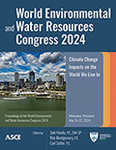Evaluating the Resilience of Hybrid Centralized and Decentralized Water Supply Systems
Publication: World Environmental and Water Resources Congress 2024
ABSTRACT
As urbanization accelerated and environmental challenges escalated, conventional centralized water supply systems (WSSs) have faced sustainability challenges from frequent droughts, climate change, energy security, water leaks, and aging infrastructure. Scientific communities have discussed that employing a decentralized WSS with local water sources can offer more sustainable water services in these circumstances. However, few efforts have been made to investigate the resilience of decentralized WSSs or hybrid centralized and decentralized WSSs against unexpected disruptions. This study evaluates the resilience of hybrid WSSs to physical/operational failures. First, this study defined the configuration and operations of a hybrid WSS and analyzed its hydraulic performance under failure scenarios using a pressure-driven model of EPANET 2.2. The failure scenarios included pipe leakage/burst and demand variation. Then, the resilience of the hybrid WSSs to the failure scenarios was evaluated using a surplus-energy-based resilience measure. The results demonstrated that the hybrid WSS produced larger resilience effects to disruptive events than its centralized WSS. The discussion on a resilient hybrid WSS was provided based on the resilience evaluation results. The findings will suggest engineering insights into how to configure the hybrid WSSs integrating centralized and decentralized WSSs to resiliently deal with unexpected failure events.
Get full access to this chapter
View all available purchase options and get full access to this chapter.
REFERENCES
Acharya, A., Liu, J., and Shin, S. (2023). “Evaluating the multi-dimensional resilience of the water distribution network to contamination events.” Water Supply, 23(3), 1416–1433.
Daigger, G. T. (2009). “Evolving urban water and residuals management paradigms: water reclamation and reuse, decentralization, and resource recovery.” Water Environment Research, 81(8), 809–823.
Daigger, G., and Crawford, G. (2007). “Enhancing water system security and sustainability by incorporating centralized and decentralized water reclamation and reuse into urban water management systems.” Journal of Environmental Engineering and Management, 17, 1–10.
De Marchis, M., Milici, B., Volpe, R., and Messineo, A. (2016). “Energy saving in water distribution network through pump as turbine generators: economic and environmental analysis.” Energies, 9(11), 877.
Fan, X., Wang, X., Zhang, X., and Yu, X. (2022). “Machine learning based water pipe failure prediction: The effects of engineering, geology, climate and socio-economic factors.” Reliability Engineering & System Safety, 219, 108185.
Gato-Trinidad, S., Jayasuriya, N., and Roberts, P. (2011). “Understanding urban residential end uses of water.” Water Science and Technology, 64(1), 36–42.
Kang, D., and Lansey, K. (2012). “Dual water distribution network design under triple-bottom-line objectives.” Journal of Water Resources Planning and Management., https://doi.org/10.1061/(ASCE)WR.1943-5452.0000161.
Larsen, T. A., Hoffmann, S., Lüthi, C., Truffer, B., and Maurer, M. (2016). “Emerging solutions to the water challenges of an urbanizing world.” Science, 352(6288), 928–933.
Leigh, N., and Lee, H. (2019). “Sustainable and resilient urban water systems: the role of decentralization and planning.” Sustainability, 11(3), 918.
Lúcio, C., Silva, C. M., and Sousa, V. (2020). “A scale-adaptive method for urban rainwater harvesting simulation.” Environmental Science and Pollution Research, 27(5), 4557–4570.
Lüdtke, D. U., Luetkemeier, R., Schneemann, M., and Liehr, S. (2021). “Increase in daily household water demand during the first wave of the Covid-19 pandemic in Germany.” Water, 13(3), 260.
Luna, T., Ribau, J., Figueiredo, D., and Alves, R. (2019). “Improving energy efficiency in water supply systems with pump scheduling optimization.” Journal of cleaner production, 213, 342–356.
Mayer, P. (1999). Residential end uses of water, AWWA Research Foundation and American Water Works Association, 1999.
Nemati, M., and Tran, D. (2022). “The impact of Covid-19 on urban water consumption in the United States.” Water, 14(19), 3096.
Rasoulkhani, K., Mostafavi, A., Cole, J., and Sharvelle, S. (2019). “Resilience-based infrastructure planning and asset management: Study of dual and singular water distribution infrastructure performance using a simulation approach.” Sustainable Cities and Society, 48, 101577.
Sapkota, M., Arora, M., Malano, H., Moglia, M., Sharma, A., George, B., and Pamminger, F. (2016). “An integrated framework for assessment of hybrid water supply systems.” Water, 8(1), 4.
Sapkota, M., Arora, M., Malano, H., Moglia, M., Sharma, A., George, B., and Pamminger, F. (2015). “An overview of hybrid water supply systems in the context of urban water management: Challenges and opportunities.” Water, 7(1), 153–174.
Sapkota, M., Arora, M., Malano, H., George, B., Sharma, A., Moglia, M., and Pamminger, F. (2014). “Scenario analysis of hybrid water supply systems: Impacts on Wastewater and Stormwater Flows.” Proc., Practical Response to Clim. Change Conf. Engineers Australia Convention. Melbourne, Australia. November 25, 2014.
Sapkota, M., Arora, M., Malano, H., George, B., Nawarathna, B., Sharma, A., and Moglia, M. (2013). “Impact of hybrid water supply systems on existing urban water service provision – a review.” 2nd Water Res. Conf., Singapore. Jan 20, 2013.
Sharma, A., Burn, S., Gardner, T., and Gregory, A. (2010). “Role of decentralized systems in the transition of urban water systems.” Water Supply, 10(4), 577–583.
Shin, S., and Park, H. (2018). “Achieving cost-efficient diversification of water infrastructure system against uncertainty using modern portfolio theory.” Journal of Hydroinformatics, 20(3), 739–750.
Sitzenfrei, R., Zischg, J., Sitzmann, M., and Bach, P. (2017). “Impact of hybrid water supply on the centralised water system.” Water, 9, 855.
Todini, E. (2000). “Looped water distribution networks design using a resilience index based heuristic approach.” Urban Water, 2(2), 115–122.
Walski, T. M., et al. (1987). “Battle of the network models: Epilogue.” Journal of Water Resources Planning and Management, https://doi.org/10.1061/(ASCE)0733-9496(1987)113:2(191).
World Bank. “Decentralizing Water and Sanitation Services: The Honduras Experience”, Results Briefs, https://www.worldbank.org/en/results (October 30, 2017).
Yannopoulos, S., Giannopoulou, I., and Kaiafa-Saropoulou, M. (2019). “Investigation of the current situation and prospects for the development of rainwater harvesting as a tool to confront water scarcity worldwide.” Water, 11(10), 2168.
Information & Authors
Information
Published In
History
Published online: May 16, 2024
ASCE Technical Topics:
Authors
Metrics & Citations
Metrics
Citations
Download citation
If you have the appropriate software installed, you can download article citation data to the citation manager of your choice. Simply select your manager software from the list below and click Download.
